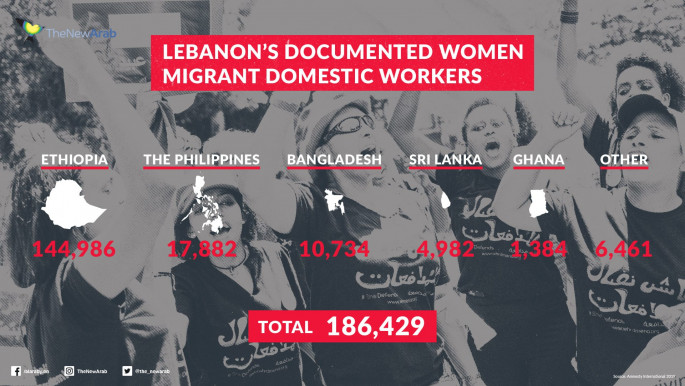Unpaid foreign domestic workers stranded in crisis-hit Lebanon
Ethiopian domestic worker Sofia was kicked out of her employer's house without her luggage, pay or passport, all wants is to go home as Lebanon begins repatriations.
"My madam threw me out. She owes me six-and-a-half months salary," Sofia said, her hair draped in a red scarf.
"I want to go back to Ethiopia," said the mother of two girls, who has not seen them for almost three years.
Lebanon is suffering its worst economic crisis in decades, as well as a coronavirus lockdown.
Some Lebanese families have started paying their home help in the depreciating local currency, while others are now unable to pay them at all, with increasing reports of domestic workers being thrown onto the streets.
Lebanon is to start repatriation flights from its closed airport on Wednesday, at first for Ethiopians and mostly male migrants from Egypt.
Outside the Ethiopian consulate on Monday, Sofia was among dozens of Ethiopian women and Lebanese employers trying to secure seats on Wednesday's flight.
But Lebanese security forces turned them away at the door, telling them to return in nine days and employers that they would have to pay for the flight.
Among the crowd, Lebanese employer Eva Awad said she could no longer afford to keep her domestic helper.
"We can't find dollars anymore, so she needs to go home," she said, adding that she intended to pay her maid in full.
'For sale'
Nearby, an Ethiopian woman cried next to her suitcase, saying she had not been paid in half-a-year, had no passport after being thrown out, and had nowhere to sleep.
A member of the security forces said the consulate's shelter was full, at least until the flight out on Wednesday.
Consular staff did not respond to repeated requests for comment.
An estimated 250,000 domestic workers live in Lebanon, the large majority Ethiopian, many in conditions condemned by rights groups.
|
||
A sponsorship system known as "kafala" excludes maids, nannies and carers from Lebanon's labour law, and leaves them at the mercy of their employers, who pay wages as low as $150 a month.
With staff obtained at high fees from recruitment agencies even before being paid wages, and unhappy workers unable to resign without their employer's permission, some have likened the system to slavery.
Activists say calls for help have increased in recent weeks, especially as live-in workers have been in lockdown with families.
"The level of desperation has just gone through the roof. There has been a vast increase in the number of people contacting us about unpaid salaries," a case worker for activist group This is Lebanon said.
She said a number had been sent back to their agencies with few prospects for re-employment.
In recent months, at least two people have posted ads to sell their foreign helper on Facebook, sparking outrage from activists and a statement from the labour ministry condemning human trafficking.
Ali Al-Amine, head of the recruitment agency syndicate, said agencies had received increasing numbers of calls from employers struggling to pay salaries in dollars.
Read also: Lebanon's Anti-Racism Movement is a lifeline for vulnerable migrant workers during coronavirus
"If people are employed by the Lebanese state, their income in Lebanese pounds is hardly enough for them to support themselves," he said.
But "if the contract was in dollars, we tell them they need to give her what is rightfully hers", he said.
The labour ministry says it has launched a hotline.
Immigration has waived fines for those who have overstayed their residency from November, a security source said.
'Thousands need food'
After Sofia was thrown out with nothing but the clothes on her back, fellow Ethiopian worker Ala, 29, found her crying in the street and persuaded her own Lebanese employer to take her in.
"There are people who are very good, who pay for your travel and treat you like family," Ala said.
The non-governmental Egna Legna association has also taken in stranded women, according to founder Banchi Yimer.
They will now join freelance domestic workers struggling to survive without work during the pandemic.
As the lockdown started, "thousands of domestic workers and their kids needed medical and food aid", said Yimer, who used to work as a domestic helper in Lebanon but is now in Canada.
In recent weeks, she and friends have raised more than $12,000 through crowdfunding to provide food and rent for hundreds of their colleagues.
But Yimer is worried about the thousands they cannot reach, donations running out, and the mounting number of people being dropped at the consulate door.
"I'm so scared even to sleep," she said.
Follow us on Facebook, Twitter and Instagram to stay connected





 Follow the Middle East's top stories in English at The New Arab on Google News
Follow the Middle East's top stories in English at The New Arab on Google News


